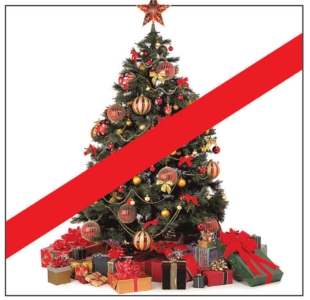Despite the city’s modern day fervor for the holidays, there was a time in the distant past when Christmas was banned in Boston.
The Puritan descendants of those who originally established the Massachusetts Bay Colony, and what would become the City of Boston, looked down upon celebrating Christmas.
When the first wave of European immigration came to the Massachusetts Bay Colony starting in the 1630s, many of the newcomers were not as strict as the Puritans in their religious observations, which became a constant source of consternation.
In the 1600s, the celebration of Christmas often induced boisterous revelry, which presented an excuse for people to drink and get rowdy.
“The day after Christmas in England found the jails filled with rioters, wassailers and brawlers,” wrote 19th century historian George E. Ellis. “Within a score of years after the settlement of Boston, the quiet town with its staid and rigid ways was often scandalized by the follies and excesses of strangers and sailors brought here in the expanding commerce and traffic.”
An account of the Plymouth Plantation from 1621 details the confusion that the account’s author, Governor William Bradford, experienced dealing with newcomers who did not want to work on Christmas Day.
“Most of this new-company excused themselves and said it went against their consciences to work on [Christmas] day,” wrote Bradford, in third person. “So the Governor told them that if they made it a matter of conscience, he would spare them until they were better informed.”
That reprieve only lasted a few hours before Bradford witnessed the excused workers playing in the streets.
The
tensions between Puritans, who ruled the local government, and incoming
waves of non-English European immigrants who observed holidays mounted
as the region-wide Massachusetts Bay Colony was established, followed by
the town of Trimounte, which would become Boston.
In 1659, the Massachusetts Bay Colony finally banned Christmas.
In
the law that officially outlawed the celebration of Christmas, the
prohibition was described as “for preventing disorders arising in
several places within this jurisdiction, by reason of some still
observing such festivals as were superstitiously kept in other
countries, to the great dishonor of God and offence of others.” The same
law also forbade card games, dice, and other “unlawful games.” Those
who were caught celebrating by not working, feasting or any other form
of observance, were fined five shillings.
Just
six years after the ban, the Court of Commissioners of Charles II
across the ocean in England declared that the holiday ban was in
violation of English law and should be repealed, but amid growing
tension between the crown and the colony, Massachusetts leadership was
slow to heed the recommendations from across the Atlantic.
The
colony finally repealed the ban in 1681, at the same time that the
colony repealed the death sentence for banished Quakers who attempted to
return to town.